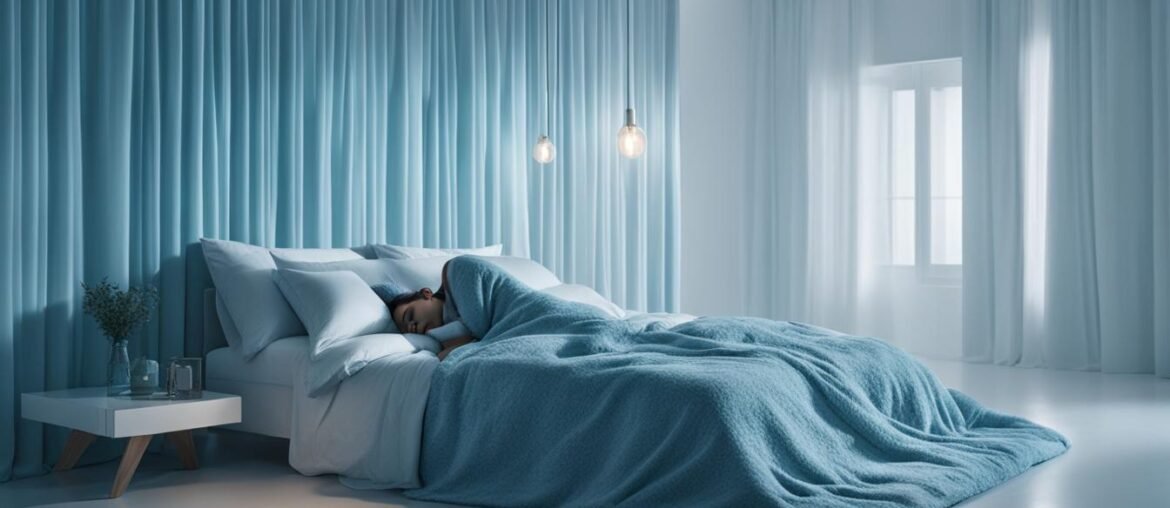When it comes to weight loss and fat burning, most people focus on diet and exercise. However, sleep plays a crucial role in achieving optimal results. Research suggests that the quality and duration of sleep can significantly impact weight management and fat burn.
One key factor that often goes unnoticed is the sleep environment and, more specifically, the temperature of the sleeping space. By understanding and optimizing sleep temperatures, individuals can unlock the secrets to maximizing fat burning during sleep.
Sleeping in an environment that is conducive to fat burn can make a noticeable difference in achieving weight loss goals. Creating an ideal sleeping temperature is not only essential for promoting quality sleep but can also enhance the body’s ability to burn calories and increase metabolism.
Studies have shown that keeping the bedroom temperature between 66-68 degrees Fahrenheit (19-20 degrees Celsius) can promote brown fat activity, a type of fat that burns calories to produce heat. This increase in brown fat activation can boost metabolism and aid in weight loss efforts (check this post out).
Creating a sleep environment that supports fat burning involves more than just adjusting the thermostat. Factors such as natural or adjustable lighting, comfortable bedding, and a noise-free setting can further enhance sleep quality.
Key Takeaways:
- Optimizing sleep temperatures can promote fat burning during sleep
- A cooler bedroom temperature of 66-68 degrees Fahrenheit (19-20 degrees Celsius) is ideal for maximizing fat burn
- Creating a sleep-friendly environment with proper lighting, comfortable bedding, and a noise-free setting can further enhance sleep quality
- Sleep plays a crucial role in weight management and overall health
- By prioritizing optimal sleep temperatures, individuals can support their fat burn and weight loss goals
The Role of Sleep in Weight Loss
Adequate sleep plays a crucial role in weight management and fat burn. Not getting enough sleep can have negative effects on our hormones, metabolism, and overall health, potentially hindering our weight loss goals.
Importance of Sleep for Weight Management:
Getting sufficient sleep is essential for maintaining a healthy weight. When we are sleep-deprived, our bodies produce more ghrelin, a hormone that stimulates hunger, and less leptin, a hormone that suppresses appetite. This hormonal imbalance can lead to increased cravings, overeating, and weight gain.
Impact of Sleep on Hormone Function:
Lack of sleep disrupts our hormone function, specifically affecting ghrelin and leptin levels. This disruption can cause an imbalance in our appetite-regulating hormones, leading to increased food intake and a higher risk of weight gain. Additionally, inadequate sleep can impair insulin sensitivity, increasing the likelihood of storing excess calories as fat.
Sleep and Metabolism:
Insufficient sleep can also slow down our metabolism, making it more difficult to lose weight. Research has shown that sleep deprivation reduces our resting metabolic rate, meaning we burn fewer calories throughout the day. This can contribute to weight gain and make it harder for us to shed those extra pounds.
Other Effects of Sleep Deprivation:
Sleep deprivation not only affects our weight but also has a negative impact on our overall health. Chronic sleep deficiency has been linked to various health issues such as weakened immune function, increased inflammation, and a higher risk of chronic diseases like diabetes and heart disease.
The Importance of Prioritizing Sleep:
To optimize weight loss and fat burn, it is crucial to prioritize sleep as part of a healthy lifestyle. By getting enough sleep, we can help regulate our hormones, boost metabolism, and support overall well-being.
Next, we’ll explore strategies for optimal sleep to maximize weight loss. But before that, let’s take a look at the impact of temperature on sleep and fat burn.
| Sleep and Weight Loss | |
|---|---|
| Importance of Sleep | Optimizing sleep is crucial for weight management and fat burn. Lack of sleep can disrupt hormone function, increase appetite, and decrease metabolism. |
| Impact on Hormone Function | Sleep deprivation can lead to hormonal imbalances, including increased ghrelin (hunger hormone) and decreased leptin (satiety hormone), promoting overeating and weight gain. |
| Sleep and Metabolism | Insufficient sleep slows down metabolism, making it harder to lose weight. It reduces resting metabolic rate, leading to fewer calories burned. |
| Other Effects of Sleep Deprivation | Chronic sleep deficiency can weaken the immune system, increase inflammation, and raise the risk of chronic diseases like diabetes and heart disease. |
Strategies for Optimal Sleep

To optimize sleep for fat burning and overall well-being, it is important to implement effective strategies that prioritize getting enough sleep, maintaining a consistent sleep schedule, and managing stress levels. These strategies can significantly improve your sleep quality and support your weight loss goals.
Getting Enough Sleep
Ensuring you get enough sleep each night is crucial for your physical and mental health. Aim for 7-9 hours of uninterrupted sleep to allow your body to rest and rejuvenate. Lack of sleep can disrupt your metabolism, increase hunger, and hinder your weight loss efforts.
Consistent Sleep Schedule
Establishing a consistent sleep schedule can help regulate your internal body clock and promote a more restful sleep. Go to bed and wake up at the same time every day, even on weekends. This helps synchronize your body’s natural sleep-wake cycle, making it easier to fall asleep and wake up refreshed.
Managing Stress for Better Sleep
Stress can negatively impact your sleep quality and make it difficult to fall asleep or stay asleep throughout the night. Incorporating stress management techniques into your daily routine, such as practicing relaxation exercises, deep breathing, or meditation, can help calm your mind and promote a more peaceful sleep.
Remember, a well-rested mind and body are better equipped to handle the challenges of the day.
Creating a sleep-friendly environment can also greatly improve your sleep quality. Ensure your bedroom is cool, dark, and quiet. Use blackout curtains or an eye mask to block out any light, and consider using earplugs or a white noise machine to minimize disruptive noises. Additionally, invest in a supportive mattress, comfortable pillows, and high-quality bedding to enhance your overall sleep experience.
| Strategies for Optimal Sleep | Benefits |
|---|---|
| Getting Enough Sleep | – Supports weight loss efforts – Enhances overall well-being – Improves cognitive function |
| Consistent Sleep Schedule | – Regulates internal body clock – Promotes better sleep quality – Helps maintain energy levels throughout the day |
| Managing Stress for Better Sleep | – Reduces anxiety and tension – Enhances relaxation – Improves sleep onset and duration |
By implementing these strategies, you can create a sleep routine that optimizes your body’s natural fat-burning processes, supports weight loss efforts, and improves your overall sleep quality.
The Impact of Temperature on Sleep and Fat Burn
When it comes to optimizing sleep for fat burning, paying attention to the temperature of your sleep environment is crucial. Research suggests that sleeping in a cooler environment can have a positive impact on both the quality of your sleep and your body’s ability to burn fat.
Studies have shown that keeping the bedroom temperature around 66-68 degrees Fahrenheit (19-20 degrees Celsius) can potentially increase the amount of brown fat your body burns. Brown fat, also known as calorie-burning fat, plays a role in boosting metabolism and aiding in weight loss.
Creating a cool sleep environment not only supports fat burn but also improves sleep quality by promoting a deeper and more restful sleep. When your body is exposed to lower temperatures, it triggers a natural drop in core body temperature, which can help you fall asleep faster and stay asleep throughout the night.
In addition to keeping the temperature cool, it is equally important to create a dark sleep environment. Exposure to light, especially blue light from electronic devices, can disrupt your body’s natural sleep-wake cycle and inhibit the production of melatonin, a hormone that regulates sleep.
By establishing a cool and dark sleep environment, you can enhance both the quality of your sleep and your body’s ability to burn fat. Incorporating blackout curtains, wearing an eye mask, and turning off electronic devices before bed are all effective strategies for creating a sleep-friendly environment.
“Creating a cool sleep environment not only supports fat burn but also improves sleep quality by promoting a deeper and more restful sleep.”
Other Factors Affecting Fat Burn During Sleep

While optimizing sleep temperature is important for enhancing fat burn during sleep, other factors such as exercise, nutrition, and avoiding stimulants before bed also play a crucial role. Incorporating these elements into your routine can further support your weight loss goals.
Exercise and Sleep
Regular exercise not only contributes to overall health and fitness but also affects the quality of sleep. Engaging in physical activity during the day can help you fall asleep faster and experience deeper, more restorative sleep at night. Incorporating exercises that promote muscle growth and metabolism can be particularly beneficial for fat burn during sleep.
| Exercise Recommendations | Benefits for Fat Burn During Sleep |
|---|---|
| Strength training | Builds lean muscle mass, increases metabolism |
| Bodyweight exercises | Improves overall fitness, aids in calorie burning |
Nutrition for Better Sleep
The food you consume throughout the day can significantly impact the quality of your sleep. Opting for a balanced diet that includes protein-rich meals can support muscle growth and metabolism, ultimately enhancing fat burn during sleep. Additionally, avoiding heavy meals close to bedtime and choosing sleep-friendly snacks can promote better sleep.
Avoiding Stimulants Before Bed
Stimulants such as caffeine and nicotine can interfere with sleep by keeping you alert and increasing restlessness. It is essential to avoid consuming these substances in the hours leading up to bedtime to ensure a restful sleep. Instead, opt for soothing herbal teas or decaffeinated alternatives to promote relaxation.
By incorporating exercise into your routine, focusing on a nutritious diet, and avoiding stimulants before bed, you can optimize fat burn during sleep and support your weight loss journey (check this post out).
Practical Tips for Better Sleep

Creating and maintaining healthy sleep habits is essential for improving sleep quality and supporting fat burn during sleep. By implementing the following sleep hygiene tips, incorporating sleep rituals, and utilizing technology for sleep improvement, you can optimize your sleep routine for better overall well-being.
Sleep Hygiene Tips
- Avoid screens before bed: The blue light emitted by electronic devices can interfere with the production of melatonin, a hormone that regulates sleep. It’s best to avoid screens at least an hour before bedtime.
- Create a calming bedtime routine: Engaging in relaxing activities before bed, such as reading a book, taking a warm bath, or practicing mindfulness techniques, can signal to your body that it’s time to wind down and prepare for sleep.
- Keep a consistent sleep schedule: Establishing a regular sleep routine by going to bed and waking up at the same time every day, even on weekends, helps regulate your body’s internal clock and promotes better sleep quality.
- Optimize your sleep environment: Make sure your bedroom is dark, quiet, and cool. Consider using blackout curtains, earplugs, or a white noise machine to create a peaceful sleep environment.
- Avoid stimulants before bed: Limit your intake of caffeine, nicotine, and alcohol, as these substances can interfere with your ability to fall asleep and stay asleep.
Sleep Rituals
Engaging in sleep rituals can help signal your body that it’s time to sleep and promote relaxation.
“I find that performing a calming activity, such as journaling or practicing gratitude, before bed helps me relax and clear my mind. It sets the tone for a restful sleep.” – Sarah, Sleep Enthusiast
Here are some sleep rituals you can incorporate into your bedtime routine:
- Practice deep breathing or meditation
- Listen to soothing music or nature sounds
- Engage in light stretching or gentle yoga
- Sip on herbal tea, like chamomile or lavender
- Use aromatherapy, such as lavender essential oil
Using Technology for Sleep Improvement
Advancements in technology have made it easier than ever to enhance sleep quality. Consider incorporating the following tech tools into your sleep routine:
| Sleep Technology | Description |
|---|---|
| Smart Sleep Trackers | Monitor your sleep patterns and provide insights into your sleep quality to help you make adjustments for better sleep. |
| Temperature-Regulated Sheets | These innovative sheets help regulate your body temperature during sleep, promoting a comfortable and cooling sleep environment. |
| Cooling Mattress Pads | A cooling mattress pad can help dissipate body heat, keeping you cool and comfortable throughout the night. |
| White Noise Machines | These devices produce soothing sounds, such as rain or waves, to block out external noise and promote relaxation. |
Remember, improving sleep quality requires a combination of healthy sleep habits, intentional rituals, and the right technology. By prioritizing sleep hygiene, incorporating sleep rituals, and utilizing technology, you can optimize your sleep routine and support fat burn during sleep.
Conclusion
Optimal sleep plays a significant role in supporting fat burn and weight loss goals. By prioritizing sleep and implementing sleep-friendly practices, individuals can enhance their overall health and achieve their desired weight loss results. Maintaining a consistent sleep schedule, creating a cool sleep environment, and practicing good sleep hygiene are key factors in optimizing sleep for fat burn.
Research suggests that sleeping in a cooler environment, around 66-68 degrees Fahrenheit, can promote fat burning during sleep by increasing calorie burning brown fat and boosting metabolism. Creating a sleep-friendly environment, with a cool and dark bedroom, can also improve sleep quality, leading to better fat burn while resting.
In addition to optimizing sleep temperature, regular exercise, a healthy diet, and avoiding stimulants before bed can further enhance fat burn during sleep. Incorporating strength training and bodyweight exercises, along with consuming protein-rich meals throughout the day, supports muscle growth and metabolism, maximizing fat burning potential.
By taking a comprehensive approach to sleep optimization, individuals can unlock the benefits of optimal sleep for fat burn and weight loss, ultimately improving their overall well-being. Prioritizing sleep health is a crucial component of any weight loss journey, supporting both physical and mental health goals.




